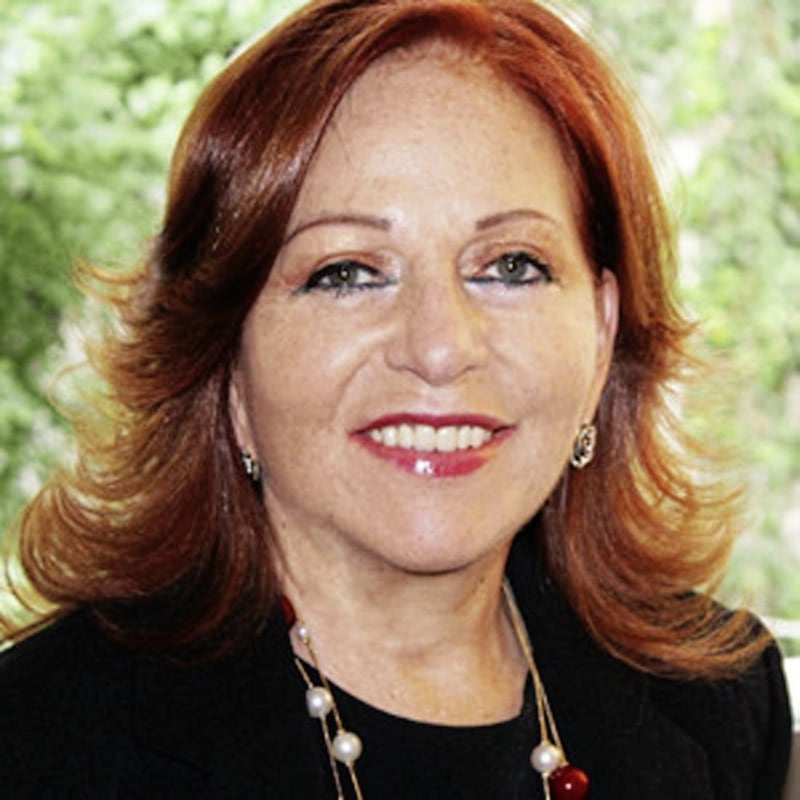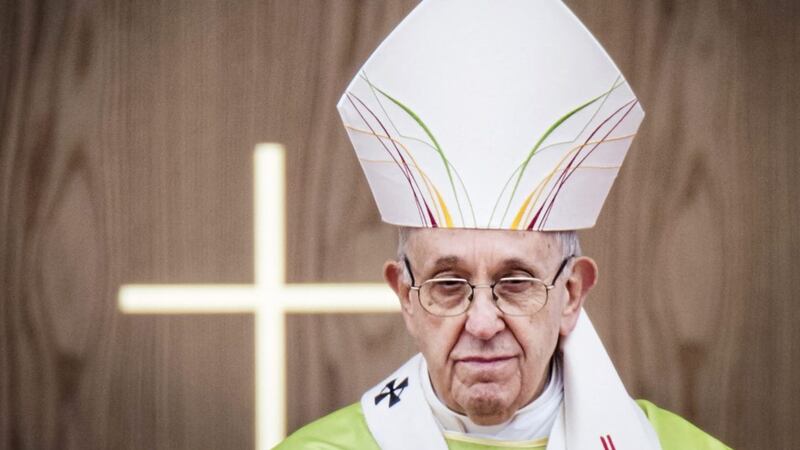AT first glance, there is little in common between you, bishops and cardinals, and me, a Catholic laywoman with no particular position in the Church - and, moreover, a journalist.
Yet we share something very powerful: we all have a mother; we are here because a woman gave birth to us.
Compared to you, perhaps I have an additional privilege: I am a mother first and foremost.
Therefore I do not feel that I am a representative just of journalists, but also of mothers, families, civil society.
I would like to share with you my experiences and my life and - if you will allow me - to add some practical advice.
For a mother there are no first or second-class children; there are stronger children and more vulnerable ones.
Nor are there first and second-class children for the Church.
Her seemingly 'more important' children - as are you, bishops and cardinals, I dare not say the Pope - are no more so than any other boy, girl or young person who has experienced the tragedy of being the victim of abuse by a priest.
What is the Church's mission? To preach the Gospel.
But to do so she needs a moral guide; coherence between what one preaches and what one lives is the basis of being a credible institution, worthy of trust and respect.
For this reason, in facing criminal conduct such as the abuse of minors, do you think that to be true to herself, an institution like the Church can have another way if not that of reporting this crime?
That she can have another way if not that of being on the side of the victim and not that of the oppressor?
Who is the weakest, most vulnerable child? The priest who abused, the bishop who abused and covered up, or the victim?
You may be certain that for journalists, mothers, families and the entire society, the abuse of minors is one of the main causes of anguish.
The abuse of minors, the devastation of their lives, of their families' lives, worries us. We believe such abuse is one of the most reprehensible crimes.
Ask yourselves: are you enemies, as determined as we are, of those who commit abuse or who cover them up?
We have decided which side to be on. Have you done so truly, or in word alone?
If you are against those who commit or cover up abuse, then we are on the same side. We can be allies, not enemies.
We will help you to find the rotten apples and to overcome resistance in order to separate them from the healthy ones.
But if you do not decide in a radical way to be on the side of the children, mothers, families, civil society, you are right to be afraid of us, because we journalists, who seek the common good, will be your worst enemies.
I have been covering the Vatican for almost 45 years. How many times have I heard that the scandal of abuse is "the press's fault, a plot by certain media outlets to discredit the Church, and that there are hidden powers backing it in order to put an end to this institution".
We journalists know that there are reporters who are more thorough than others and that there are media outlets more or less dependent on political, ideological or economic interests.
But I believe that in no case can the mass media be blamed for having uncovered or reported on the abuse.
Abuses against minors are neither rumours nor gossip: they are crimes.
I remember Pope Benedict XVI's words during the flight to Lisbon when he told us that the greatest persecution of the Church comes not from external enemies but arises from sins within her.
Journalists are neither those who abuse nor those who cover up; our mission is to assert and defend a right, which is a right to information based on truth in order to obtain justice.
We journalists know that abuse is not limited to the Catholic Church, but you must understand that we have to be more rigorous with you than with others, by virtue of your moral role.
Stealing, for example, is wrong, but if the one stealing is a police officer it seems more serious to us because it is the opposite of what he or she should do, which is to protect the community from thieves.
If doctors or nurses poison their patients rather than take care of them, the act draws even more of our attention because it goes against their ethics, their professional code.
As a journalist, as a woman and mother, I would like to tell you that we think abusing a minor is as contemptible as is covering up the abuse - and you know better than I that abuses have been covered up systematically, from the ground up.
I think you should be aware that the more you cover up, the more you play ostrich, fail to inform the mass media and thus, the faithful and public opinion, the greater the scandal will be.
Communicating is a fundamental duty because, if you fail to do so you automatically become complicit with the abusers.
By not providing the information that could prevent these people from committing further abuse, you are not giving the children, young people and their families the tools to defend themselves against new crimes.
The faithful do not forgive the lack of transparency, because it is a new assault on the victims.
Those who fail to inform encourage a climate of suspicion and incite anger and hatred against the institution.
Victims have first and foremost the right to know what has happened, what you have done in order to distance and punish those who have committed abuse.
Silence gives the impression that the accusations - be they true or false, partly true and partly false - are totally true and that there is fear of giving a response that can be immediately contradicted
Even if the guilty party is dead, the victim's pain is not extinguished. Although the guilty party can no longer be punished, at least the victim, who perhaps has lived many years with that hidden wound, can be consoled.
Additionally, other victims who remain in silence will dare to come out, and you will promote their healing and their consolation.
I think it would be healthier, more positive and more helpful if the Church were the first to provide information, in a proactive and not reactive way, as normally happens.
You should not wait to respond to legitimate questions from the press - or from the people, your people - when a journalistic investigation uncovers a case.
In the age we live in, it is very difficult to hide a secret. With the prominence of social networks, the ease of posting photos, audio and video, and the rapid social and cultural changes, the Church has only one path: to concentrate on awareness and transparency, which go hand in hand.
Report things when you know them. Of course, it will not be pleasant, but it is the only way, if you want us to believe you when you say "from now on we will no longer tolerate cover-ups".
The first to benefit from transparency is the institution, because the focus is on the guilty party.
Pope Francis told the Curia that in other eras, in addressing these subjects, there was ignorance, lack of preparation, and disbelief. I dare say that there was also corruption.
Behind the silence, the lack of healthy, transparent communication, quite often there is not only the fear of scandal, concern for the institution's good name, but also money, compensation and gifts.
Pope Francis reminds us that the devil enters through the pockets, and he is absolutely right. Transparency will help you to fight economic corruption.
Transparency will help you to be coherent with the Gospel message and to put into practice the principle according to which in the Church no-one is above the law: we are all accountable to God and to others.
Secrecy, in the sense of an excessive tendency toward secrecy, is strictly tied to the abuse of power: it is like a safety net for those who abuse power.
I believe that in no case can the mass media be blamed for having uncovered or reported on the abuse. Abuses against minors are neither rumours nor gossip: they are crimes
Today our societies have adopted transparency as a general rule, and the public believes that the only reason not to be transparent is the desire to conceal something negative or corrupt.
My sensation is that within the Church there is still more resistance to recognising that the problem of abuse exists and it is imperative to address it with all the instruments possible.
Some believe that it happens only in certain countries. I believe we can speak of a generalised situation, to a greater or lesser extent, which in any case must be dealt with and resolved.
Those who hide something are not necessarily corrupt, but all corrupt people are hiding something.
Not all those who keep secrets are committing an abuse of power, but all those who abuse power are generally hiding things.
Of course, transparency has its limitations.
For this reason, we do not expect you to inform us of just any accusation against a priest.
We understand that there can and must be a prior investigation - but do so quickly, comply with the laws of the country you live in and, if envisaged, present the case to the civil justice system.
If the accusation is shown to be credible, you must provide information about the ongoing processes, about what you are doing; you must say that you have removed the guilty party from his parish or from where he was practising; you must report it yourselves, both in the dioceses and in the Vatican.
At times, the Holy See provides information about a resignation without explaining the reasons.
There are priests who have gone immediately to inform the faithful that they were ill and not that they were leaving because they had committed abuse.
Who is the weakest, most vulnerable child? The priest who abused, the bishop who abused and covered up, or the victim? You may be certain that for journalists, mothers, families and the entire society, the abuse of minors is one of the main causes of anguish
I think that the news about the resignation of a priest who has committed abuse should be released with clarity, in an explicit way.
I have already told you that I think communication is indispensable to resolving this problem.
Now allow me to suggest three ways for you to put transparency into practice at the moment of communicating about the sexual abuse of minors.
1. Put the victims in first place
If the Church wants to learn how to communicate about abuse, her first point of reference must be the victim.
Pope Francis has asked the participants in this meeting to meet the victims, to listen to them and to be available to them before coming to Rome.
Victims are not just numbers; they are not statistics. They are people whose lives, sexuality, emotions, trust in other human beings, perhaps even God, as well as the ability to love have been ruined.
And why is this important? Because it is difficult to inform and communicate something about which we have no direct knowledge.
We cannot speak about abuse if we have not listened to the victims, if we have not shared their pain, if we have not touched by hand the wounds that abuse has caused not only in their bodies but also in their minds, in their hearts, in their faith.
If you meet them, they will have a name; they will have a face, and the experience you have with them will be reflected not only in the way in which you confront the issue, but also in the way in which you communicate and resolve it.
The Pope has told us that he meets them regularly, at Santa Marta, that he considers them his priority.
You should do the same; I do not believe you have less time than the Pope.
Remember, transparency is showing what you do.
In facing criminal conduct such as the abuse of minors, do you think that to be true to herself, an institution like the Church can have another way if not that of reporting this crime?
2. Allow yourselves to seek advice
Before making decisions, seek advice from people with sound judgment who can help you.
There should always be communicators among these advisers.
I think the Church should have, at all levels, communications experts, and should heed them when they tell her that it is always better to inform than to keep silent or even lie.
It is an illusion to think that a scandal can be hidden today. It is like covering the sky with a finger. It cannot be done.
It is no longer acceptable nor permissible. Thus, all of you must understand that silence is far more costly than facing reality and making it public.
I think it is essential that you invest in communications in all your ecclesiastical structures, with highly qualified and experienced individuals in order to address the demands for transparency in today's world.
3. Professionalise your communications
In the third place, you must communicate better.
What kind of transparency do journalists, mothers, families, the faithful, public opinion expect from an institution such as the Church?
I think it is fundamental that, at every level, from the parish to the Vatican, there should be agile and flexible structures that quickly offer accurate information.
It may be incomplete for lack of a deeper investigation, but the response cannot be silence or 'no comment', because then we will seek answers by asking others, and thus it will be third parties informing people in the way they wish to do so.
If you do not have available all the necessary information - if there are doubts, if there is already an investigation - it is better to explain it in the best way possible so as not to give the impression that you do not want to respond because you are hiding something.
Silence gives the impression that the accusations - be they true or false, partly true and partly false - are totally true and that there is fear of giving a response that can be immediately contradicted.
I have seen with my own eyes how bad information, or inadequate information, has caused tremendous damage, harmed the victims and their families, not allowed justice to be served, caused the faith of many people to waver.
I assure you that investing in communications is a very profitable matter, and is not a short-term investment; it is a long-term investment.
I hope that after this meeting you will return home and not avoid us, but instead seek us out.
I hope you will return to your dioceses thinking that we are not vicious wolves but, on the contrary, that we can join our forces against the real wolves.
Valentina Alazraki is Vatican correspondent for Mexican broadcaster Noticieros Televisa. She is one of the most experienced reporters in Rome, having been based there since 1974; she followed the end of the pontificate of Pope Paul VI, the 33 days of the pontificate of John Paul I, the entire pontificates of John Paul II, Benedict XVI and now Pope Francis. She has covered 150 journeys with John Paul II, Benedict and Francis.

This is abridged from the Vatican-provided translation of her presentation, Communication: For All People, to the Protection of Minors in the Church meeting held in February.
The full text of her presentation and others can be found here.








